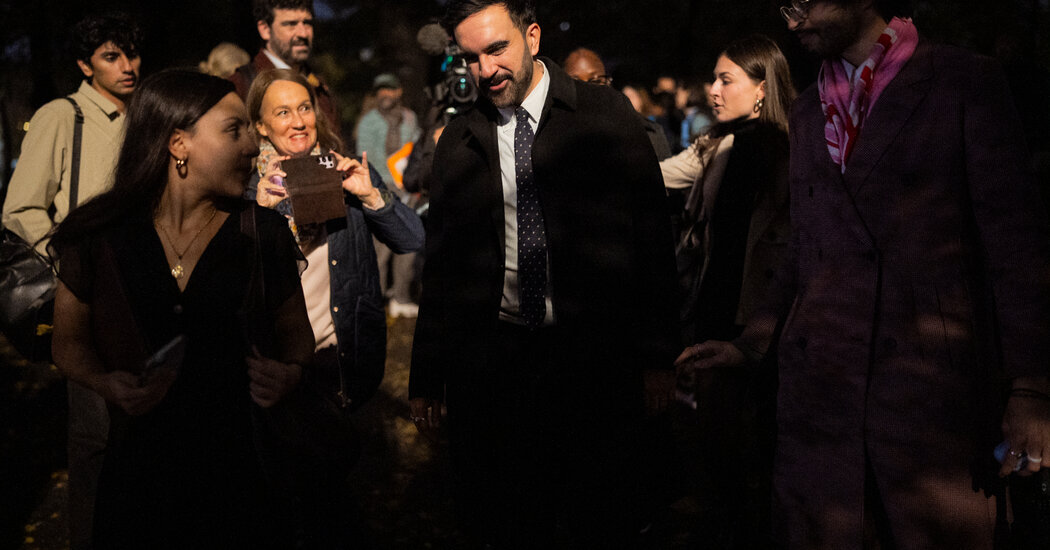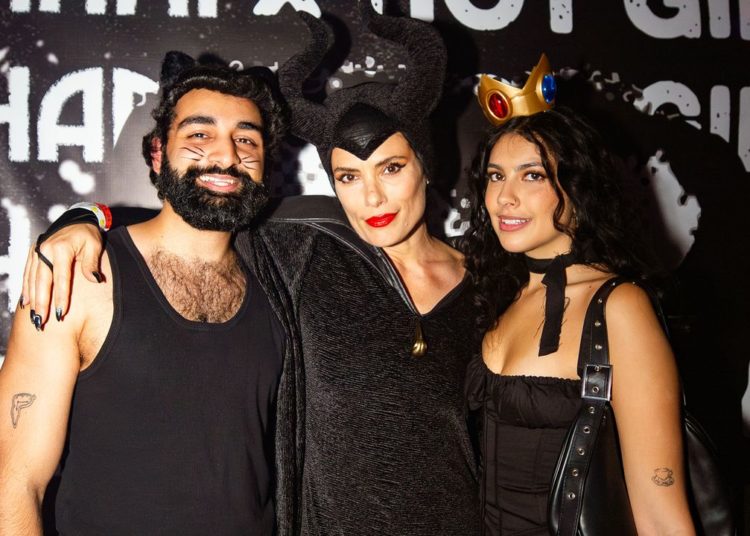The taxi dispatcher shepherding yellow cabs toward the terminal at LaGuardia Airport on Thursday night was perplexed. The taxis were lining up, but they weren’t moving.
The dispatcher, Mohammad Alam, moved down the line and saw why: Zohran Mamdani, the Democratic candidate for mayor, was canvassing the cab line.
“I never expected him to be here,” Mr. Alam said, after stopping to pose for a selfie. Later, he would FaceTime his wife so that she could speak with Mr. Mamdani, too.
“Hopefully he will do something good for us,” he said. “Let’s see.”
In the closing days of the campaign, Mr. Mamdani, a state assemblyman who has been leading in polls, has tried to renew a focus on working-class New Yorkers who he has said are often overlooked.
On Thursday evening, Mr. Mamdani, 34, took it a step further, talking to those on the night shift. He stopped to chat with taxi drivers at LaGuardia, night-shift hospital workers in Elmhurst and those working at diners in Jackson Heights.
As he spoke to voters and addressed reporters at a news conference, Mr. Mamdani promised to be a different kind of night mayor than Mayor Eric Adams, ribbing his onetime political rival for his fondness for nightlife. Mr. Adams dropped out of the race for mayor earlier this month.
“Less Zero Bond,” he said, a reference to Mr. Adams’ favorite private club in Manhattan. He added that he wanted to visit nurses and bus operators on the night shift, raising New Yorkers “often forgotten from the darkness and into the light.”
Mr. Mamdani has previously drawn attention to bleary-eyed New Yorkers who keep the city humming 24 hours a day. Before the primary, he embarked on a trek from Manhattan’s top to its tip — Inwood to Battery Park — that brought him in contact with night-shift workers whose stories he has highlighted on the trail.
The city’s taxi drivers hold a special place in his political rise.
Early in his time in the state assembly, Mr. Mamdani took part in a 15-day hunger strike in 2021 to push city officials to help cabbies who were crushed by debt from predatory lending practices. Ultimately, the city agreed to a program that would forgive millions of dollars in debt.
It was one of Mr. Mamdani’s first major political pushes. On Thursday night, some members of the Taxi Workers Alliance, a group of drivers who took part in that strike, helped the assemblyman canvass.
One of them, Erhan Tuncel, said that he was impressed with Mr. Mamdani during their action but that he could not have anticipated how his political star would have risen.
Mr. Mamdani said that his concern for taxi drivers came in large part from a shared political identity: About 40 percent of them are of South Asian descent, like the assemblyman. And as he shook hands through yellow cab doors or posed for selfies through the windows, rain dripping onto his black suit, he greeted a handful of drivers in English, Hindi and Urdu as he urged them to vote.
“For South Asians growing up in New York City, taxis were one of the ways we would see ourselves as part of the fabric of this city,” Mr. Mamdani said.
Izzy Moustafa, a driver who stopped to take a picture with Mr. Mamdani, said that he appreciated the assemblyman’s new ideas and vision for the city, even if Mr. Mamdani’s youth was something of a concern.
“He may lack for experience,” Mr. Moustafa said. “But I like that he will bring something fresh. And he’s better to have than someone who we already had as governor and who didn’t do enough.”
Still, not every cabbie was won over. Mamadou Diallo, 35, of Corona, said that though he agreed life in the city was precariously unaffordable, he was not convinced that Mr. Mamdani had the chops to address the issue.
“He really can’t do anything that will fix it,” Mr. Diallo said, adding that he was disappointed by Democratic leadership and planned to vote for the Republican candidate, Curtis Sliwa.
After speaking to drivers at the airport, Mr. Mamdani rode in an S.U.V. to the city-run Elmhurst Hospital Center to catch nurses, doctors and other staff in time for an 11 p.m. shift change. Then, he made the brisk 10-minute walk to Kabab King, a restaurant in Jackson Heights that he has been visiting since high school, for naan, kebabs and biryani.
Around midnight, he left the restaurant for a news conference in Diversity Plaza, where he commended the “many people who work” while New Yorkers “celebrate the city that never sleeps, without asking ourselves who doesn’t get to sleep at those hours.”
Tim Balk contributed reporting.
Michael Gold covers Congress for The Times, with a focus on immigration policy and congressional oversight.
The post Mamdani Takes His Campaign to the Night Shift appeared first on New York Times.




